

Indonesia and Malaysia Agree to Care for Stranded Migrants. Indonesia and Asia shrug over Myanmar Rohingya and Bangladesh migrants stranded in Andaman Sea. A Rohingya child who recently arrived by boat has his picture taken for identification purposes at a shelter in Kuala Langsa, in Indonesia's Aceh Province, May 18, 2015.
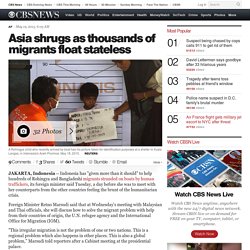
REUTERS JAKARTA, Indonesia -- Indonesia has "given more than it should" to help hundreds of Rohingya and Bangladeshi migrants stranded on boats by human traffickers, its foreign minister said Tuesday, a day before she was to meet with her counterparts from the other countries feeling the brunt of the humanitarian crisis. Foreign Minister Retno Marsudi said that at Wednesday's meeting with Malaysian and Thai officials, she will discuss how to solve the migrant problem with help from their countries of origin, the U.N. refugee agency and the International Office for Migration (IOM). Mass graves of Rohingya, Bangladeshi migrants in Malaysia's forests: report. A Rohingya child, who arrived in Indonesia this week by boat, receives medical treatment for an eye infection at a temporary shelter near Langsa in Indonesia's Aceh Province.
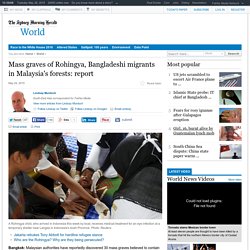
Photo: Reuters Bangkok: Malaysian authorities have reportedly discovered 30 mass graves believed to contain the bodies of hundreds of Rohingyas and Bangladeshis near Malaysia's border with Thailand. Southeast Asia’s Migrant Crisis Explained, in Maps. Just as it took a deadly shipwreck to finally put the spotlight on the dire migrant crisis in the Mediterranean, it’s taken the stranding of some 6,000 migrants — and perhaps several times that number — at sea in Southeast Asia to raise the alarm about another migrant crisis stemming from what some observers describe as a genocide playing out in Myanmar.

Like Europe’s, Southeast Asia’s migrant crisis isn’t new. Every year, between late fall and the start of Southeast Asia’s monsoon season in April or May, thousands from the Rohingya ethnic group, a Muslim minority in Myanmar that faces intense persecution at the hands of the government and other factions, board rickety fishing boats to flee their country. Extremist Buddhist mobs have carried out pogroms against the group, and the government of Myanmar denies the Rohingya basic rights of citizenship. Southeast Asian countries now seem to be adopting a similar approach. A Border Town Built for Vice. Putin: Russia can influence E.Ukraine, but it's up to Kiev to solve crisis — RT News. Merkel Raps Putin Over Ukraine Conflict During Visit to Moscow. Ukraine conflict: Why is violence surging? Pro-Russian rebels have entered the strategic town of Debaltseve in eastern Ukraine after heavy fighting - despite a ceasefire agreement.
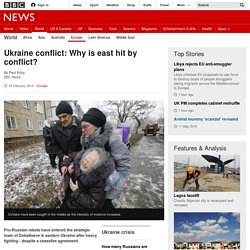
Most of the Ukrainian government forces have pulled out of the town, a key transport hub. A new truce deal was reached on 12 February through international mediation, in an attempt to stop the fighting spiralling out of control. What prompted the flare-up in a conflict that has cost more than 5,600 lives and few saw coming? How did eastern Ukraine return to full-scale conflict? Fighting started in April 2014 and raged for months until Ukraine and the separatists came to a deal on 5 September to halt the violence and free prisoners. Ukraine ceasefire agreed at Belarus talks. The leaders of Russia, Ukraine, France and Germany have reached a ceasefire deal after 17 hours of talks in Minsk, Belarus, on the Ukrainian conflict.
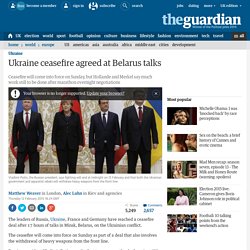
The ceasefire will come into force on Sunday as part of a deal that also involves the withdrawal of heavy weapons from the front line. Russian president Vladimir Putin was the first to announce the deal, saying: “We have agreed on a ceasefire from midnight 15 February.” Putin added: “There is also the political settlement. China’s New Military Installations in the Spratly Islands: Satellite Image Update — Satellite Image Analysis. China’s New Military Installations in the Disputed Spratly Islands: Satellite Image Update Recent high-resolution images show new areas of reclamation on Mischief and Subi Reefs, and intensive construction on Fiery Cross as well as several other reefs.
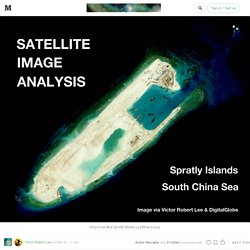
By Victor Robert Lee 16 March 2015 China is rapidly transforming numerous reefs of the Spratly island group into military installations, part of a strategy to solidify its hold on the South China Sea despite competing territorial claims by Vietnam, the Philippines, Malaysia, Taiwan and Brunei. Why a partitioned Iraq is a bad idea. In May 2006, months into a rapidly deteriorating sectarian war in Iraq, then–Democratic Sen.

Joe Biden wrote in The New York Times that the country’s partition was already underway. “The Sunnis, who until recently believed they would retake power in Iraq, are beginning to recognize they won’t and don’t want to live in a Shiite-controlled, highly centralized state with laws enforced by sectarian militias,” he wrote in an op-ed jointly penned by Leslie Gelb of the Council on Foreign Relations.
An entire island nation is preparing to evacuate to Fiji before they sink into the Pacific - Quartz. This has to be the weirdest business deal of the week: The Church of England just sold a chunk of forest-covered land on the Fijian island Vanau Levu for $8.8 million to the government of the Pacific island nation of Kiribati.
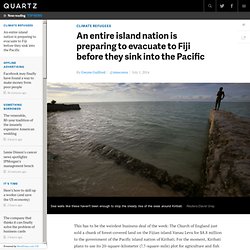
For the moment, Kiribati plans to use its 20-square-kilometer (7.7-square-mile) plot for agriculture and fish farming. But the investment is really a fallback for its 103,000 residents—a place to live if they must leave their home island. Report: Slavery traps nearly 30 million people worldwide. Slavery remains a serious global problem, with 29.6 million people in various states of forced servitude, including sexual exploitation, debt bondage and forced marriage, according to a new report. Paul Romer: Why the world needs charter cities. If No One Wants Them, Where Do We Resettle The World's Refugees?
The drought in Somalia has gone from bad to worse.
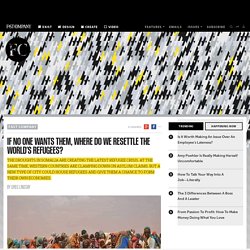
At least 29,000 children have died in the worst famine in 60 years. If that weren’t enough, the provisional authority governing Somalia has virtually no control outside Mogadishu (where a cholera outbreak is spreading), while Al-Shabbab insurgents controlling the southern arm of the country are both blocking aid groups from entering and preventing refugees from leaving. Twelve million people across the Horn of Africa are in need of food, the U.N. says. Those who can flee, are. More than a million refugees have already crossed into Ethiopia and especially Kenya, where the camps at Dadaab have quickly become the world’s largest. What is Statelessness? To understand how a person can lack a nationality, it helps to know how nationality works in practice.
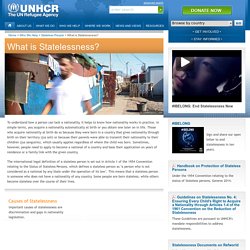
In simple terms, you acquire a nationality automatically at birth or you obtain one later on in life. Those who acquire nationality at birth do so because they were born in a country that gives nationality through birth on their territory (jus soli) or because their parents were able to transmit their nationality to their children (jus sanguinis), which usually applies regardless of where the child was born. Sometimes, however, people need to apply to become a national of a country and base their application on years of residence or a family link with the given country. NATURAL BORN STATELESS OCTOBER 2013: Forced To Flee. Adventures in mapping. Far-Right Fever for a Europe Tied to Russia. Photo LE CHESNAY, France — At a rally last week near the Palace of Versailles, France’s largest far-right party, the National Front, deployed all the familiar theatrics and populist themes of nationalist movements across Europe.
A standing-room-only crowd waved the national flag, joined in a boisterous singing of the national anthem and applauded as speakers denounced freeloading foreigners and, with particular venom, the European Union. But the event, part of an energetic push for votes by France’s surging far right ahead of elections this week for the European Parliament, also promoted an agenda distant from the customary concerns of conservative voters: why Europe needs to break its “submission” to the United States and look to Russia as a force for peace and a bulwark against moral decay. Parag Khanna: Mapping the future of countries. Stateless People. People are often asked, at some point in their lives, what nationality they have. However, not many question how and why they have acquired their nationality. Sanctions should be coupled with political dialogue in Ukraine. Second, the crisis has several geopolitical ramifications. The Kremlin’s actions have undermined European security, delivered a body blow to international law, weakened the nuclear nonproliferation regime by fatally undermining the role of security guarantees for nonnuclear states and raised doubts about the predictability of Russia under its current leaders.
All of this will have far-reaching effects in the years and decades ahead, ranging from the realignment of formal and informal alliances and the militarization of security arrangements to possible – and long-discussed – adjustments in the international governance system. Russia’s expulsion from the G-8 and renewed military build-ups are only the first of many such changes. Third, the Ukraine crisis will completely transform Russia’s relations with the West. Fourth, having annexed Crimea, Russia has lost Ukraine, turning it from friend to foe.
Given all of these potential dire consequences, it is vital to prevent Cold War II. NATURAL BORN STATELESS OCTOBER 2013: China Rising - Special series. After centuries of western dominance, the world’s centre of economic and political weight is shifting eastward. What Do Chinese Students Think of American History? - David Caragliano. When a Fulbright scholar arrived in China to teach U.S. history, she encountered students who interpreted the subject in surprising ways. A map of the United States, in Chinese. (Wikimedia Commons) White male privilege, genocide against Native Americans, slavery and subsequent racial oppression, exploitation of immigrants and laborers, repression of women and homosexuals, and environmental destruction -- teaching American cultural history through a post-modern lens is hardly the most obvious way to promote positive feelings toward the United States. Putin is not crazy. Frustrating, unpredictable. Not crazy.
President Obama has called Vladimir Putin “the bored kid in the back of the classroom,” putting on an unsmiling, tough-guy “shtick.” Hillary Clinton just compared the Russian president to Hitler. Why the Crimean Conflict is Not a New Cold War. References to the Cold War have flourished in official statements and newspaper headlines throughout the weekend.